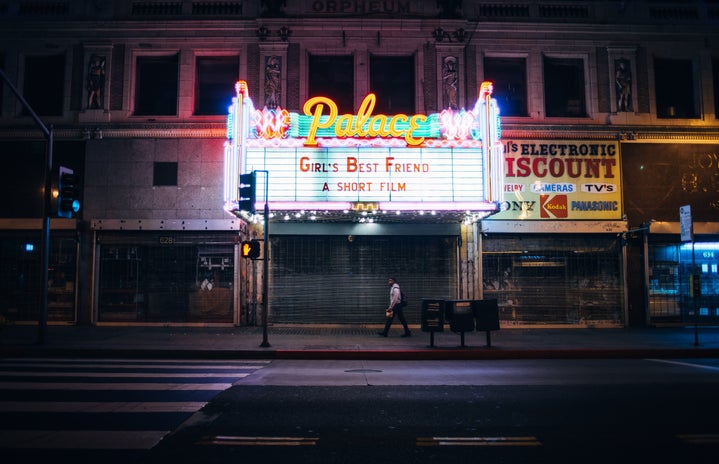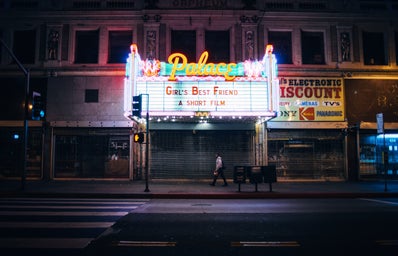Dubbed a modern-day Cinderella story, Anora stars Mikey Madison as its eponymous lead, an escort who is swept off her feet in a whirlwind romance with Vanya, the son of a wealthy oligarch. The latest (and first American since 2011) film to cinch Cannes’ most prestigious Palme d’Or pays homage to the Pretty Woman (1990) hooker-with-a-heart-of-gold trope, subverting such fairytale narratives refreshingly, alongside the outdated notion that one doesn’t have to be saved by Prince Charming, but can find happiness in an ordinary man with a decent heart. Should it then be lauded as a feminist triumph?
The difference in life experience between Anora, 23, and Vanya, 21, belying their two-year age gap, I initially expected development of their chemistry beyond the superficial or sexual, but quickly realised this was not the case – the symbiosis of their set-up was all that briefly held their shotgun-like marriage up. Having directed The Florida Project, vividly developing an impoverished child’s worldview, it made sense that Sean Baker would not settle for a story as inauthentic as those of Disney or Hollywood romcoms. It’s clear what Baker was trying to do, but I think there was a lack of nuance to its central character, and an ultimately unsurprising plot.
Anora portrays the careful maintenance of male fantasy, Ani wearing tiny mini-skirts and sparkly tinsel in her hair reminiscent of Euphoria, complete with boundless energy and doe-eyes. It captures the performative nature of being an adult performer seeking the male gaze – what’s wrong with that?
One of my main gripes with this film was its lack of development of Anora’s inner world. What was her backstory? What were her dreams? What drew her to the dizzying world of erotic performance? We’re only given her apartment in Brighton Beach that she shares with her sister, and superficial contact with her fellow performers. While this makes sense as the film captures her failed assimilation into the Russian’s spaces in a linear plotline, it felt a little too two-dimensional, and quickly predictable.
The film wasn’t short of genuinely fun moments that reminded me how much I missed going to the cinema – hello, the wedding in Vegas to Greatest Day (Robin Schulz Rework)? It was also laugh-out-loud funny in places, but ultimately, I wasn’t entirely sold by its half-leans into comedy and seriousness.
Despite these qualms, I liked how class-consciousness underscored the film. The power imbalance between Anora and her club’s management, endlessly out-of-touch Vanya, and complex dynamics between Anora and the men ordered to capture her, Igor, Garnick, and Toros, all explore the intersection between sex and class. Where the film shone was in its portrayal of an uncertain Anora, first lusting over the glamour of marriage to Vanya, and more crucially, the liberation she believes she’ll find, then slowly becoming more cognisant of his world’s dysfunction. And that he’s really just a mummy’s boy, almost benignly, yet rather unsympathetically, savouring his last taste of freedom in the shape of study abroad, lacking any true volition. I loved her character arc, and the self-preservation she seems to find, spitting Vanya’s mother’s typecasting back in her face, much to the amusement of his father. This really drove home the sense that the rich’s absorption in their own vanity lacks depth; none of this actually matters, whereas for Anora, it was a chance at a new life, the unrecognisable.
However, a sharp dose of reality returns, the scene’s closing scene bleakly exposing Anora’s inner struggle. She is unable to accept Igor’s unconditional benevolence, sex and affection confined to the transactional for her. The intimacy of her kiss with Igor evokes a mixed response, Anora unable to open herself up to and accept common gestures of love beyond the physical. I appreciated the subtlety of this scene as opposed to the flashy, at times just so surface atmosphere of the film, although I knew this was the point – the emptiness beneath facades. I know this was just a subplot to the film, but I wish Baker’d gone further with it. Anora’s most compelling, almost unlikely, relationship to me was the most ordinary, insofar as it was comical, little gestures of warmth almost out of place – the offer of a scarf on a cold beach, and discussions about the most quotidian things in the likes of Vanya’s world (is this Russian sable, or mink?) The red scarf exemplifies Baker use of clothing to symbolise power and develop the complex dynamic between Anora and Igor.
It’s tempting to compare this to Parasite, considering its genre; I feel like with a similar run-time, Anora packed a lot less in and meshed satire and darker drama far less seamlessly. There were definitely moments where I felt this film seemed to go on forever – I was just not that invested in their hunt for the playboy Vanya (who didn’t need saving…)
I left the cinema unsure about what this film offers to the feminist discussion. I can’t fault that it’s a cautionary tale, subversive, and a visual feast; perhaps by expecting more, I’m just nitpicking and don’t know how to have fun.


